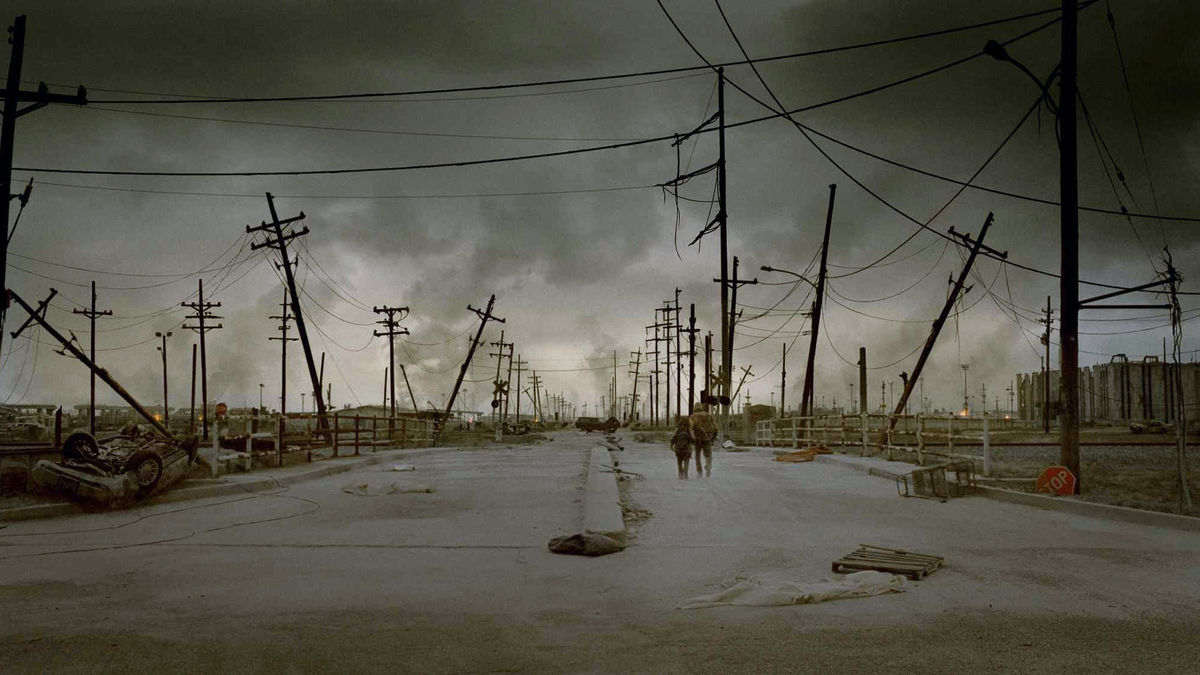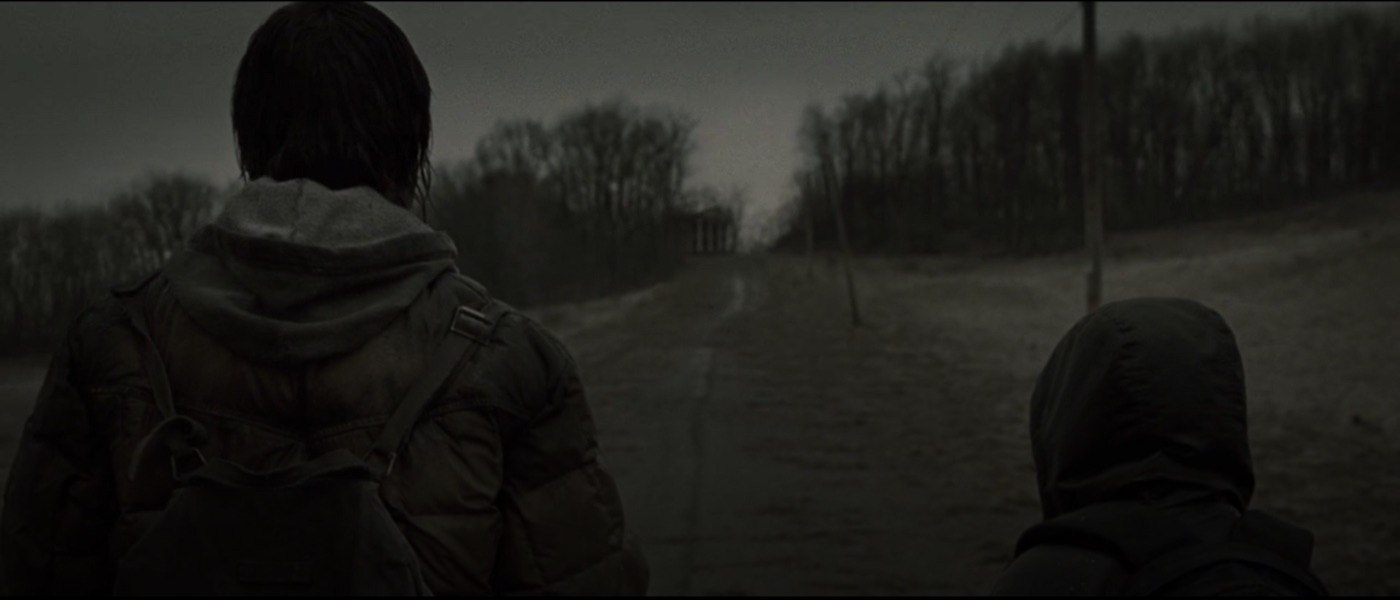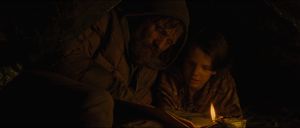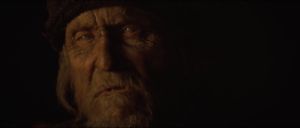February 9, 2012: Difference between revisions
(Created page.) |
m (Tweaked cats.) |
||
| Line 76: | Line 76: | ||
{{2012}} | {{2012}} | ||
[[Category:02/2012]] | [[Category:02/2012]] | ||
[[Category: | [[Category:Literary]] | ||
Revision as of 14:49, 23 July 2020
Cormac McCarthy's Apocalypse: Signs and Maps Along The Road[a]
The nature of my current thinking about Cormac McCarthy’s The Road is intertextual. This novel resists any unified reading we might try to impose, and I think that has to do with the subject matter. How do you talk about the end of meaning in any sort of meaningful way? This is an ontological question in at least two senses: a stylistic one and a thematic one. It often seems to me that anytime we try to talk about the apocalypse—or the singularity for that matter—we slip into nostalgia to guide our way forward.
The Road imposes a literary reading on a future that is already written as the extinction of humanity. The characters attempt to read this end in a variety of ways, and that becomes the ultimate moral center of the novel. The man’s is haunted by a past before the end, the despair of his wife, his devotion to his son, and the death mythologies that try to impose their death orders. The boy’s reading is necessarily informed by his father, but is not ultimately subject to those narratives that haunt the man and keep him from searching for meaning beyond his son. The man seems to see the world as binary: his son is good and the rest of the decaying planet is not—and therefore a threat. The boy longs for meaning beyond this small sphere, and ultimately has to be freed of the man in order to find his own path, no matter how uncertain it is.
At the conclusion of T.S. Eliot’s 1922 poem The Waste Land, the narrator sits on the shore having just traversed the ruins of western civilization and asks
| “ | “Shall I at least set my lands in order?” | ” |
To me, this question has always characterized the thematic emphasis of twentieth-century modernism. It’s a question that Eliot is asking of himself as an individual and a poet, but perhaps more profoundly, it’s one he wants the reader to consider as a tacit fellow traveler along a road with no signs and no maps.
I must first contextualize my current thinking about McCarthy’s The Road. Last fall, I taught a special topics course called “Utopia & Apocalypse” in which we examined mostly texts for the western landscape after World War 1. We examined McCarthy’s novel as an exemplar of the apocalypse—that which seems to inevitably follow the demise of an attempted utopia, like the holocaust following the failed experiment of the Third Reich. While it might seem odd to compare the nightmare of the Nazis with the dream of a “good place,” most utopian visions that followed WWI seemed to fit the second meaning of utopia: “no place.” And this is a good thing; no one would really want to live in Orwell’s Oceania of Nineteen Eighty-Four, or in the society of Zamyatin’s We, or in Huxley’s Brave New World.
“Apocalypse” also has a double meaning. On one hand, from the Greek ἀποκάλυψις (apokálypsis), we get literally a “lifting of the veil,” or a revelation. The other meaning—one that Hollywood seems to enjoy presenting to us—is closely associated with the biblical revelations of God and concomitant nightmare visions of end times. The final judgment. The final reckoning where good and evil must come to terms.
So, in a sense, utopia and apocalypse share a clear similarity. Both present visions of “no place” that attempt to reveal something about the values or practices of the culture from which it emerged—particularly those that grew out of a modernist zeitgeist. I know it’s somewhat egregious to reduce works like A Clockwork Orange, A Handmaid’s Tale, or Never Let Me Go to mere allegory—for certainly literature is more than a moral. However, if you’ll indulge me, utopian—perhaps it’s more accurate to call them dystopian after World War I—images do always seem to offer something cautionary and potentially revealing about the culture. Add to this the increased mechanization and technological sophistication to the realities of two World Wars, and the end is not hard to imagine. If we try too hard to set our lands in order, what might be the result? While the utopian visions seem to impose too much order, the apocalyptic removes it.
McCarthy’s The Road—even by its very title—seems to suggest that even at the end of the world, humans need to keep moving. Despite the horrors we meet throughout the journey, we might find what we’re looking for. McCarthy’s novel seems to echo Eliot’s modernist question—but whereas Eliot’s poem ends with some answers seemingly thundering from God himself, we have no such divine order along McCarthy’s road.
When it is obvious that there is no God, what is the message of his prophets?
Carrying the Fire
Eliot found guidance in myth, as did many of the modernists. In Joyce and Yeats, Eliot observed that they, “the scientist who uses the discoveries of an Einstein in pursuing his own, independent, further investigations” were “manipulating a continuous parallel between contemporaneity and antiquity” as “a way of controlling, of ordering, of giving shape and significance to the immense panorama of futility and anarchy which is contemporary history.” He called this approach the “mythic method,” and suggested that it is a way—to paraphrase another line from The Waste Land—to shore these fragments against his ruins. The modernist quest through crisis and rupture is an individual one, it seems, for both the narrative participants and those who come along—i.e., the readers. The man and the boy must build maps for their journey through the waste land, but the fragments they have to assemble are from a time and place that no longer exists and has little bearing on the reality that they now face.
It is clear to the man that his life is linked to the well-being of the boy. At one point early in the novel, he tells the boy: “My job is to take care of you. I was appointed by God to do that” (77). He acts as protector—doing anything to keep the boy safe, even killing, robbing, and torturing to do so. He resolves to also act as the boy’s killer, should the circumstances eliminate their choice. However, unlike the resolve of his absent wife, he questions his ability to take his son’s life, even if the situation should demand it. His doubt becomes a demon that haunts him throughout the novel, asking “Can you do it? When the time comes? Can you?” (29). The man knows that the boy is all that stands between him and death, so his raison d’être becomes keeping the boy moving forward. Indeed, it’s clear that the man doesn’t have much time left, and he needs to prepare the boy to carry on without him.
The man also acts as a guide, telling the boy stories to give their journey a purpose. The chief narrative centers on the idea of “carrying the fire.” They are the “good guys” on a mission who “wouldnt ever eat anybody.” For the boy, the ambiguous “carrying the fire” becomes his guiding moral principle, even when it’s at odds with his safety. To the boy, part of carrying the fire is sharing it with others in their time of need—of taking a risk to help another traveller on the road. Near the end of the novel, the boy challenges the truth of the man’s stories: “in the stories we’re always helping people and we dont help people” (268).
The man also provides a link to the world before. Most of the narratorial voice is filtered through the man, so the vocabulary and imagery that links the present with the past seems to be filtering through the man. There are a couple things to note about the narrative style. First, the unnecessary mechanics of current English are paired down to the essentials: quotation marks, hyphens, and apostrophes are removed along with any superfluous dialog. Even sentence fragments will often do. Like Hemingway’s Nick Adams stories, much of the detail and action is left for the reader to infer. This stark minimalist style suggests a closer connection with reality, but McCarthy’s apocalyptic style, however, is anything but realistic. Perhaps, it would be more appropriate to say that it is more consciously literary in its minimalism.
For example, McCarthy chooses esoteric and archaic vocabulary throughout the novel. Many of these words describe common items—like “gryke,” “cairn,” and “midden”—but they take on a prosaic strangeness that interrupts the narrative flow and forces an artistic distance between the horror of the action and the artifice of its telling. The same literary style is seen in descriptions of the mundane and those passages that echo the biblical revelations, like the maps and roadsigns of an extinct world:
| “ | What time of year? What age the child? He walked out into the road and stood. The silence. The salitter drying from the earth. The mudstained shapes of flooded cities burned to the waterline. At the crossroads a ground set with dolmen stones where the spoken bones of oracles lay moldering. No sound but the wind. What will you say? A living man spoke these lines? He sharpened a quill with his small pen knife to scribe these things in sloe or lampblack? At some reckonable and entabled moment? He is coming to steal my eyes. To seal my mouth with dirt. | ” |
It makes sense that at the literal end of the world the literary would begin to impose itself on the real. In the absence of any other guiding maps or markers, the mythology of a race heading for extinction would be a way to inscribe meaning to meaninglessness. At the center of the man’s world is the boy: “He knew only that the child was his warrant. He said: If he is not the word of God God never spoke” (5). The man looks to the past for meaning, but the boy can only look forward.
There Is No God and We Are His Prophets
The boy is a child of the apocalypse. He was born after the ambiguous catastrophe; it’s the only world he’s known, and his father his only guide in it. He man plays Virgil to the boy’s Dante, and like Virgil, the man can only take him so far.
In a crucial scene in the middle of the novel, they meet an old man that calls himself “Ely.” In Hebrew, “Elijah” means “ascension,” and he is also the biblical prophet and harbinger of the messiah. In a way, he is the prophet of the apocalypse, for the coming of the messiah would mean the destruction of the old way of life to make way for a new, Messianic Age. On the road, “Ely”—who admits that’s not his real name—takes on the literary role of the prophet of nihilism/atheism when he states “There is no God and we are his prophets” (170). His prophecy challenges the man’s faith in his son, perhaps illustrating the man’s reluctance to communicate with anyone along the road. Near the end of their conversation, Ely states that when he saw the boy, he thought he had died. The man attempts to interpret Ely’s statement as divinely inspired, and asks Ely if he thought the boy was an angel or a god. Then, Ely speaks his prophecy:
| “ | I’m past all that now. Have been for years. Where men can’t live gods fare no better. You’ll see. It’s better to be alone. So I hope that’s not true what you said because to be on the road with the last god would be a terrible thing so I hope it’s not true. Things will be better when everyone’s gone. (172) | ” |
This enigmatic statement seems to suggest that holding on to a mythology that is as dead as the planet can only lead to more suffering. The man’s faith in the boy—his dependance on him for his own meaning in life—can only end badly as long as the man holds on to dead myths and calls them hope. After they leave Ely, the man gets increasingly desperate and violent towards outsiders, while the boy begins to repudiate the man’s stories and longs for other human connections. Shortly after the man kills another to save the boy, the latter sees another boy who the man will not let him pursue. The mirror boy becomes central to the boy’s quest. Near the end of the novel, the boy lets the man know his hope:
| “ | There could be people alive somewhere else. |
” |
For the boy, his answer is other people, particularly other children. His father and his father’s stories are keeping him from making a meaningful connection with the followers—people that turn out to be a family with a little boy and a little girl.
Perhaps my earlier comparison to Virgil and Dante is an apt one. The classical Roman poet could only take Dante so far—through Hell and Purgatory—but he was unable to enter paradise with Dante. You see, Virgil was a pagan who—along with the other poets before him like Ovid, Homer, and Horace—had not been saved, and therefore had to die with the old world. Dante needed a new guide for Paradise, someone who was willing to help him further. Dante got Beatrice and the boy receives a new family.
Yet, before Dante can leave Purgatory, he must drink of the Rivers Lethe and Eunoë; the former removes memories of sin, and the latter restores the past without shame or guilt. This experience cleanses Dante, washing away not the memory of his sins, but the guilt that keeps him from salvation. The idea of memory is what’s important here. After the man dies, the boy states “And I wont forget. No matter what” (286). What he won’t forget seems to be what his father sacrificed for him and the importance of the connection that they had. This connection was the fire he was carrying that he can now share with his new family.
Note
- ↑ Presented at the Southwest Texas PCA Conference, Albuquerque, NM, February 2012.



